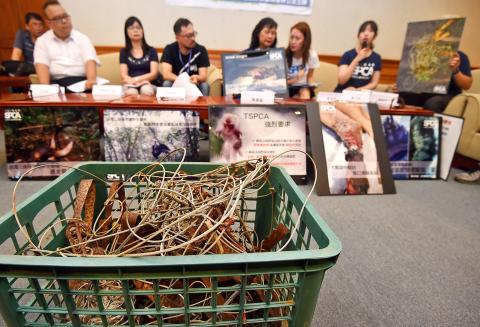An animal advocacy group yesterday called for a ban on steel snares, which they said hurt stray dogs, while an expert said that a ban could result in farmers using more inhumane alternatives such as poison.
Taiwan Society for the Prevention of Cruelty to Animals executive director Connie Chiang (姜怡如) said the group has found that monkeys and stray dogs were caught in steel snares, resulting in broken limbs or starvation.
Chiang cited a report by the Yilan County Animal and Plant Disease Control Center for the society’s findings.

Photo: Chien Jung-fong, Taipei Times
Control center section chief Liu Pi-yang (劉必揚) said an inspection in 2015 found about 80 steel snares in the Paolun community (匏崙) in Jiaoxi Township (礁溪), adding that five stray dogs have been injured by snares since then.
“It is difficult to identify who is setting up the snares,” he said.
The society’s legal specialist, Chou Jing-fan (周敬凡), called for an official ban on the steel snares.
Article 19 of the Wildlife Conservation Act (野生動物保育法) prohibits “the use of traps, snares or other hunting equipment” to capture animals, Chou said, adding that the act should be amended to explicitly ban steel snares.
“Any cruel device [for capturing animals] should be banned,” he added.
Protecting animals is everyone’s obligation, Democratic Progressive Party Legislator Chen Man-li (陳曼麗) said, adding that she supports the proposed ban.
“This has nothing to do with the conflict between Aborigines and Han people,” she added.
However, Savungaz Valincinan, a member of the Indigenous Youth Front, said advocates of the ban were criminalizing Aborigines.
She said that animal rights advocates should not frame the issue around “prohibition” and Aborigines’ accountability.
Many farmers, not only Aborigines, use snares to capture intruding animals, said Kurtis Jai-Chyi Pei (裴家騏), professor at National Dong Hwa University’s College of Environmental Studies.
Banning steel snares might be counterproductive because farmers would find alternatives like using poisons, he said, adding that stray animals and leopard cats are often injured by such methods.
People who want to capture animals should use more humanitarian means that are precise and cause no suffering to animals, he said.
“Traps are already banned, but many people are still using them,” he said. “The key lies with improving enforcement.”

Several Chinese Nationalist Party (KMT) officials including Chairman Eric Chu (朱立倫) are to be summoned for questioning and then transferred to prosecutors for holding an illegal assembly in Taipei last night, the Taipei Police said today. Chu and two others hosted an illegal assembly and are to be requested to explain their actions, the Taipei City Police Department's Zhongzheng (中正) First Precinct said, referring to a protest held after Huang Lu Chin-ju (黃呂錦茹), KMT Taipei's chapter director, and several other KMT staffers were questioned for alleged signature forgery in recall petitions against Democratic Progressive Party (DPP) legislators. Taipei prosecutors had filed

Taiwan would welcome the return of Honduras as a diplomatic ally if its next president decides to make such a move, Minister of Foreign Affairs Lin Chia-lung (林佳龍) said yesterday. “Of course, we would welcome Honduras if they want to restore diplomatic ties with Taiwan after their elections,” Lin said at a meeting of the legislature’s Foreign Affairs and National Defense Committee, when asked to comment on statements made by two of the three Honduran presidential candidates during the presidential campaign in the Central American country. Taiwan is paying close attention to the region as a whole in the wake of a

NEW WORLD: Taiwan is pursuing innovative approaches to international relations through economics, trade and values-based diplomacy, the foreign minister said Taiwan would implement a “three-chain strategy” that promotes democratic values in response to US tariffs, Minister of Foreign Affairs Lin Chia-lung (林佳龍) said. Taiwan would aim to create a “global democratic value chain,” seek to capitalize on its position within the first island chain and promote a “non-red supply chain,” Lin was quoted as saying in the ministry’s written report to the Legislative Yuan submitted ahead of the legislature’s Foreign Affairs and National Defense Committee meeting slated for today. The Ministry would also uphold a spirit of mutual beneficial collaboration, maintaining close communication and consultations with Washington to show that Taiwan-US cooperation

Taiwan and the US have begun trade negotiations over tariffs imposed by US President Donald Trump earlier this month, Minister of Foreign Affairs Lin Chia-lung (林佳龍) said in an interview this morning before reporting to the Legislative Yuan’s Foreign Affairs and National Defense Committee. The Taipei Economic and Cultural Representative Office (TECRO), Taiwan’s de facto embassy in the US, has already established communication channels with the US Department of State and the US Trade Representative (USTR), and is engaging in intensive consultations, he said. Points of negotiation include tariffs, non-tariff trade barriers and issues related to investment, procurement and export controls, he